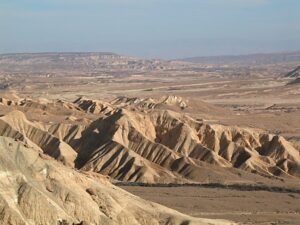By Susan Goldberg Schwartz
Picture yourself driving through fog or a whiteout during a snowstorm. Can you recall a moment of disorientation, a sense of confusion or a feeling that you lost your way? I had a similar, although not weather related, experience while driving through West Virginia a few weeks ago, when the connection from my phone to the car suddenly stopped working. The navigation system and map that I was trusting to guide me disappeared from the screen. I had a moment of panic and confusion but fortunately, I wasn’t alone (and we had actual maps in the car).
Now, picture yourself lost and wandering in a desert. That should not be too hard as many of us have recently gathered around our Seder table to experience the story of Passover, the Israelites’ release from slavery and their wandering in the desert. We retell the story as if we, too, were slaves and now are free.
And now we find ourselves in the season of Counting the Omer, S’firat HaOmer, a traditional practice of counting the 49 days between Passover and Shavuot. This tradition began as an agricultural ritual, waving a sheaf (an omer) of barley at the beginning of the harvest season. It later became the way to symbolically mark the time of the Israelites’ journey from slavery to revelation, from Egypt to the Promised Land.
Spiritually, Counting the Omer is a time for personal reflection, setting intentions to grow and change, being aware of where one has been and seeking direction to where one is going. Rabbi Yael Levy explains “…standing each night to count the day that is coming helps me to be awake to the passage of time…all life is in constant motion. Counting the day that I am entering requires that I let go of what has been…” By letting go, we are inspired to think about something new to explore and experience.
A new book, Awe: The New Science of Everyday Wonder and How It Can Transform Your Life written by Dacher Keltner, a Psychology Professor at UC-Berkley recently caught my attention. Keltner describes awe as “the emotion we experience when we encounter vast mysteries that we don’t understand” and “the feeling of being in the presence of something vast that transcends your current understanding of the world.”
Awe is also described as a feeling of reverential respect mixed with fear or wonder. Hmmm… both fear and awe are translated into the same Hebrew word Yirah.

Sinai Wilderness
The Israelites, once they left Egypt, left behind the only life they had known for an unknown future. Their time in the desert, bamidbar, was a time of transition, a forced letting go. Perhaps the newly freed Israelites were experiencing awe and wonder as they wandered. But we also know that they were fearful. They needed time and the expanse of the desert to cultivate their trust and experience hope, to ready themselves to receive the Torah and become a People.
Bamidbar. We may wander but we are not lost.
Shabbat Shalom and blessings for a season of meaningful counting.
Susan Goldberg Schwartz is a Jewish Educator at LiNK Jewish Buffalo.

